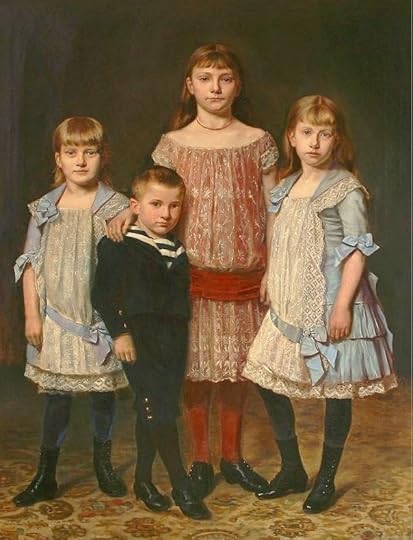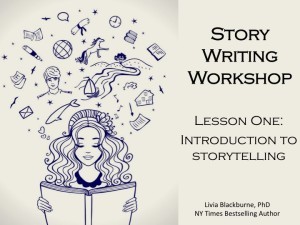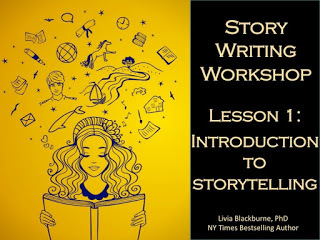Livia Blackburne's Blog
June 24, 2025
Logical vs. Intuitive Writing
When I first started writing, my writing process was quite intuitive. I'd daydream on my way to work about what happens next. Scenes would appear in my head and I’d write them down. It was all very unstructured, free, and fun.
I soon found though, that intuitive writing couldn't get me to the finish line. To get past plot holes and the murky middle, I needed analytical writing techniques like outlining, plot structure, and analyzing other books for their component parts. As I became more experienced as professional writer, I got better deploying these tools, and I think mastering these tools made up much of my growth as a writer. It wasn't that I encountered fewer problems with my drafts as I gained experience, I just better knew the steps I could take to solve them.
Worth noting here: one thing that greatly developed my logical writing skills was working on IP projects like Feather and Flame. Instead of acting like an artist with a song to sing, I became a craftsman constructing a story for my client. Need romance? I know just the right swoony moments to add. Need tension? Here are five ways to raise the stakes.
Lately, though, I’ve found myself relying too much on these logical tools. For example, I was brainstorming a picture book a while back with a coauthor. Armed with a topic, I immediately jumped into generating story ideas. Once I had the story ideas, I built them out using my usual processes. The story ideas were fine, but they didn’t sparkle. Then my coauthor suggested a new story direction, and this one immediately spoke to me. It had heart in the way that the others didn't, and I immediately knew that was the way to go.
The same thing happened recently while brainstorming my adult fantasy. I started out with a few recycled plotlines from shelved manuscripts and dutifully started organizing it into a synopsis. But again, I didn’t feel that spark of excitement. It was only when I reread the shelved manuscript, that I rediscovered the missing element — a concept I had cut out to fit the new world building. I added the concept back in, adapted to fit the new world, and suddenly my muse returned.
These experiences remind me that I can’t ignore the intuitive, emotional part of my writing, especially at the beginning of the creative process. My stories work best when they start with a spark that excites me — an image, a concept, a plot twist, an emotion that sustains me and draws in my readers. Granted, the magic almost always fades halfway through writing, and then you have to muscle your way to the end. But I can’t use my ability to muscle through the doldrums as an excuse to start a project without a spark in the first place.
So how do I stay in touch with that creative, fun side of writing? Dreams. Phone free time. Morning pages. Daydreaming in bed. Reading other books. Changing my surroundings. Freewriting. New experiences. Music. Paying attention to the things I love. Keeping inspiration lists.
I need to make time in my creative and professional life for these practices.
Are you an intuitive or logical writer? At what stages do you tilt one way or the other?
Hope you enjoyed this post! To get regular updates from this blog, use the subscription options on the sidebar.
May 21, 2025
How I Prepared for My First Nationally Syndicated Radio Interview
You sounded so eloquent on NPR!
The text from an old high school classmate popped up during lunch. My Dreams to Ashes interview had just aired on NPR's Here and Now, and from the texts and emails coming in, I was getting some good insight into which of my friends were NPR fans.
Mostly, I reacted to the congratulatory notes with relief. I'm not a naturally good speaker, and I'd been quite nervous working up to the interview. Luckily, my friend and sometimes publicist Emily Terry from Open Book Publicity worked hard with me to prep. This was the first time I'd prepared systematically for an interview, and it was helpful enough that I'm planning on doing this for all my book publicity here on out. I thought I'd share our process, in case it's useful to other writers.
1. Prepare short answers beforehand
I didn't know what the host Scott Tong was going to ask, but based on previous interviews and the subject matter of the book, I had a pretty good idea of the themes they'd touch upon. Emily suggested that I prepare answers of about 2-3 sentences each for the themes I wanted to hit. Since the book was about the LA Chinatown Massacre, I made sure to prepare a short description of the event itself (although Scott ended up introducing the event for me). I also prepared answers about why I wrote this as a children's book, how I ended up deciding to write it , parallels I saw between the massacre and present day, and what I hoped people would take away from it.
Emily also gave me some ideas for good talking points topics in general:1. A-ha moments in the process2. What inspired the book?3. Anything that tripped you up.4. Anything that surprised you.5. Why is the topic relevant to present day?6. It might help to have an excerpt picked out if they ask you to read.7. Your research process.9. Your personal connection to the subject matter.10. What was easy or hard about the process?
2. If it helps, run the answers by a friend
I sent my notes to Emily, and she made some suggestions for other things I could touch on.
3. Practice the answers, but not too much
I worked my way through the answers while washing dishes at night. But I also made sure not to over-rehearse, so it would still sound natural. I tried to remember to talk slowly and get in the habit of not saying "um" when I needed to think.
4. Listen to other interviews from the outlet (but only if it helps, not if it makes you nervous)This is self explanatory. It's nice to know what to expect, but not at the expense of nerves!
5. Have your notes in front of you for the interview!That's the great thing about a radio interview, you have your cheat sheet. I personally like to have bullet points since I find them easier to skim on the fly. During the interview, there will be questions that you don't anticipate, but if you have these prepared points to return to, it frees up your brain space to handle the unexpected questions. And it's funny what one's brain comes up with on the spot. When Scott asked me why there was such anti-Chinese sentiment in the years before the massacre, my mind went straight to a Wicked (which my daughter has been obsessed with for the past few months). I ended up paraphrasing the wizard when he says that the best way to bring people together is a common enemy. I certainly hadn't expected to go that direction!
6. Make sure you're in a quiet spot for the interview. Try to eliminate interruptions.Here and Now's sound engineers requested that I turn off my HVAC and put my cell on Do Not Disturb. I also disconnected my landline, got rid of anything that rustled, and removed my earrings so they wouldn't bang against the phone. I'd learned the hard way about interruptions when a neighbor started using his leaf blower in the middle of another interview I did with Taiwan's Central News Agency.
7. Post production is your friendThis was a recorded interview, and I was pleasantly surprised at how much better I sounded here than in the recording session. They'd cut out places where I stumbled and also removed some questions that didn't have very interesting answers. Obviously, you can't control how the outlet edits you, but it's comforting to remember that those really polished voices you hear on the news are often the post-edit version, and you'll likely sound better too. (Unless it's a hostile outlet in which case, yikes!)
8. Build rapport and have fun!
This may sound cliche, but the more relaxed you are, the more likely you are to build rapport with your interviewer, and the better it will flow.
Do you give interviews as part of your job? How do you prepare? (And if you're curious about the interview, should be embedded above. Or you can find it at WBUR's site)
Hope you enjoyed this post! To get regular updates from this blog, use the subscription options on the sidebar.
December 22, 2021
How to Personalize a Query in 10 Minutes
Every so often, I’ll meet a querying writer who’s burnt out because she’s taking hours to personalize her query letters. When I queried for Midnight Thief, I spent a long time perfecting the query itself, but I only spent about 10 minutes personalizing per agent. That’s really all you need do. Indeed, I’d argue it’s all you SHOULD do.
Remember that even the most successful writers get tons of rejections. Every query letter (individually) will have a very small chance bringing in an offer of representation. Don’t sink hours into each one. That’s a how writers end up jaded and bitter.
Don’t get me wrong, I’m not saying you should shotgun the same letter to every agent in Writer’s Marketplace. Researching agents and personalizing your queries will give you a big leg up as far as getting requests. The trick is to do the right amount of research, and the right amount of personalization.
What’s the right amount? You need to answer two questions. 1) Does the agent represent your genre? 2) Does the agent have a good sales record in your genre.
The definition of “good “ will vary for every writer, and there are resources that discuss the pros and cons of an established agent vs. a young, hungry one. But the point is that you need to know if the agent can sell what you write. The Publisher’s Marketplace genre-specific dealmaker lists are a helpful resource, as well as looking up the agents of authors you admire, or talking with other writers.
And that’s all you need to know. You don’t need to know the name of the agent’s favorite author as a child, or the names and ages of their pets. You don’t need to scroll through their entire social media feed to extract a profile of their working style, or go through their list to see if their recent YA fantasy sales match up in tone and flavor with your own YA Fantasy.
That kind of rabbit hole can eat up hours of your time. Also, you’re unlikely to get much useful information from social media profiles and web pages. If you’re offered representation, you’ll learn much more by talking to the agent’s existing clients than you ever will from a twitter feed.
(Yes, it’s perfectly acceptable to ask to be put in touch with existing clients when you’re offered representation. The agents don’t always oblige, but it’s perfectly fine to ask.)
Also, the only way to truly know if the agent connects with your writing is to send it over to them. When I was querying my current agent Jim McCarthy, I didn’t he’d be interested in high fantasy because all the recent sales I saw were paranomal. Good thing I sent a query anyways.
So, how exactly do you do a ten minute query personalization? You need several things: your generic query, a few useful informational sites, and a blank word document. Back when I was querying, I relied heavily on Publisher’s Marketplace and the blog Literary Rambles, but that was ten years ago. I’m not sure what the kids are using these days.
Your generic query will be your entire query except for the opening paragraph that’s tailored to each agent. That includes your pitch, your bio, and your signoff.
Now, we’ll write a separate greeting and intro sentence for each agent. First, pick an agent from your list. Write the saluation: “Dear. Mr./Ms. [Agent name]”
Easy enough. Now look through the informational pages that you’ve conveniently opened in a tab on your browser, and find ONE connection between the agent and your book.
Maybe they recently sold a book in your genre. Maybe they said in an interview that they admire a book similar to yours. Maybe they are requesting your genre on their webpage.
It doesn’t have to be the best connection ever. In fact, it shouldn’t be, because that would take way more time than it’s worth. All you’re trying to demonstrate here is that you’ve done your research. Personalizing beyond this point has vastly diminishing returns.
The best query in the world won’t get you representation. Only your manuscript can do that. Queriesonly functions to get your foot in the door.
(One exception: if you’ve met the agent in person, then it definitely makes sense to jog their memory about your meeting.)
So for my successful query to Jim, I said: “Dear Mr. McCarthy, I noticed on your Publishers Marketplace page that you represent quite a few young adult books with magical elements.”
And left it at that. I couldn’t even say high fantasy because I didn’t see any recent high fantasy sales from him. But my personalization was enough to show him that I’d put in the effort to research.
For more commentary from Jim, as well as my full query, see this blog post.
So you have your personalized salutation and you have your one sentence reason for querying. Now move on to the next agent in your list, rinse and repeat. Once you have done this for all the agents in your querying round, then go through and send all your letters, copying in the personalized intro followed by the generic query.
And then you’re done. You’ve spent one to two hours personalizing queries and another hour or so sending them. Now, go write your next book while you wait. You are a writer, after all.
June 22, 2017
Questions I'm asking while revising UMBERTOUCHED
1. Does every side character have a goal/personality/?
2. Could every scene be pushed to be more dramatic, action packed?
3. Can each character relationship be pushed for more tension?
4. Is backstory shown rather than told?
5. Does every development make things harder for the protagonists?
6. Are any sequences too predictable? Can you change expectations so the reader is more surprised?
What questions guide your revision process?
Hope you enjoyed this post! To get regular updates from this blog, use the subscription options on the sidebar.

July 4, 2016
Brain Science For Writers Roundup 7/4/16

By Anonymous - http://kykolnik.dreamwidth.org/, Public Domain, https://commons.wikimedia.org/w/index...
Featured: Fountain of Youth: The Secret Power of Friends and Family. Beyond the interesting biology, also underscores the importance of social networks.
Featured: Our collective memory, like individual memory, is shockingly fallible
Can you trust your gut when public speaking?
Maths helps ‘locked-in’ pair show awareness for first time
Here's a really simple trick that could help you enjoy more lucid dreams
We are most vulnerable to temptation when it feels like we're in the middle of something
You Don't Know as Much as You Think: False Expertise
People who have experienced more adversity show more compassion
Flashing Lights and Sounds Turn Rats Into Gamblers
These 50 overweight women kept a week-long "fat stigma" diary
Hope you enjoyed this post! To get regular updates from this blog, use the subscription options on the sidebar.

June 27, 2016
Short Powerful Vignettes (Analyzing The Winner's Crime)
I recently read The Winner's Crime by Marie Rutkoski. So good!
One thing I really liked about Rutkoski's writing is how she layers together small scenes that offer bits of insight into the characters.
For example, this passage from Winner's Crime. A short 3 paragraph scene.
Kestrel’s father inspected the puppy. He gripped the scruff of its neck and held it stock-still. He lifted the surprisingly big paws. He held the muzzle and peeled back the pink-and-black lips to see the teeth.
“That’s a good dog,” he said finally. “You’ll have to train her.”
No, Kestrel decided. She didn’t.
The scene doesn't really advance the plot, but it's a really telling moment that reveals something about Kestrel's relationship with her father. I like how Rutkoski didn't feel any need to pad the scene with anything extra. There's nothing about the father coming into the room, seeing the puppy, leaving the room afterwards. It's just got the key conversation. It enough conveys what it needs to, and it trusts the reader to fill in the blanks.
There are many of scenes like this in the series. They're not all as short as the one I quoted, but they're short, powerful vignettes, that when taken together create a really layered feel for the characters and relationships. It's a neat way to structure a story. There are certainly long scenes that move the plot along, but there are also many short scenes with the extraneous details removed, leaving just the meat and emotion of the moment.
Hope you enjoyed this post! To get regular updates from this blog, use the subscription options on the sidebar.

June 20, 2016
Brain Science For Writers Roundup 6/20/16

By Wayne Short - Edited version of File:Boxing080905.jpg, Public Domain, https://commons.wikimedia.org/w/index...
Featured: The Limits of Fight-or-Flight Training
Featured: Why We Snap: From Road Rage to Barroom Brawls
Students who believe they have more "free will" do better academically
The Strain of Always Being on Call
By age 8, children already recognise the greater moral seriousness and consequences of criminal acts compared with mere mischief
Is It Your Turn to Speak? Watch My Eyes
What's it like to be an autistic person at work?
Why Preteen Friendships Are Fleeting
Making a Memory of Murder
Why Boredom Is Anything but Boring
Hope you enjoyed this post! To get regular updates from this blog, use the subscription options on the sidebar.

June 14, 2016
Setting up Surprises (Analyzing The Wrath and the Dawn)
I read The Wrath and the Dawn, a retelling of a thousand and one nights by Renee Ahdieh, and loved the lush, romantic story. I also admired how Ahdieh set up expectations several times and then surprised the reader by going the the opposite direction.
(Major spoilers to follow.)
Example One:
Background: The Caliph of Khorasan takes a bride every night and kills her the next morning. The main character Shazi volunteers to be his bride, with the ulterior motive of exacting revenge on the Caliph for murdering her best friend. She stays alive by her wits, and the two start to fall in love. However, the Caliph's cousin Jalal eventually learns of Shazi's deception.
Setup: The cousin comes into the Caliph's room and hands him the incriminating evidence, begging the Caliph to give Shazi a chance to defend herself, since Jalal has also grown fond of her. However, the Caliph doesn't respond. He simply stares at the evidence and storms out of the room. He takes out a dagger and confronts Shazi.
The surprise: The Caliph kneels down at Shazi's feet, hands her the knife, and gives her permission to kill him for what he did to her friend.
I love this. The Caliph's actions would have been dramatic to begin with, but the setup scene with beforehand, with Jalal begging for mercy on Shazi's behalf, makes us expect a fight. This makes the Caliph's actions even more powerful.
Example Two:
Setup: Shazi's friend and first love Tariq finally attacks the Caliph's Palace in an attempt to rescue her. He doesn't know know that she's fallen in love with the Caliph and befriended his cousin Jalal. Shazi takes herfriend to the stables to help him escape, though she secretly plans to stay. As they're in the stables readying the horses, they're discovered by the Jalal. Tensions flare, and it looks like a fight will break out.
The surprise: Just as we expect Jalal to take Shazi back into the Palace, he instead asks Tariq to take Shazi away to safety.
Now your turn, readers. Read any books where the author set up some nice surprises?
Hope you enjoyed this post! To get regular updates from this blog, use the subscription options on the sidebar.

March 3, 2016
Brain Science for Writers 3/3/16
 © User:Colin / Wikimedia Commons, via Wikimedia Commons
© User:Colin / Wikimedia Commons, via Wikimedia CommonsThe articles in this week's edition are from early last year, actually. But still interesting!
Top Pick: How Typing Is Destroying Your Memory
Simple Jury Persuasion: “I will give you this car for $9,000.” Framing offers in terms of what the other party is gaining increases their chance of acceptance.
Motivated to Fail: When Flunking Becomes an Ambition
Unsupervised Habits Reign in Obsessive-Compulsive Disorder
Hit the Gym after Studying to Boost Recall
How to Combat Distrust of Science
Breaking the Silence: How I Conquered Selective Mutism
There Are Only Six Basic Book Plots, According to Computers (via Passive Guy)
Momnesia: Does Pregnancy Really Change The Brain?
Winning SCRABBLE and the Nature of Expertise
Brainstorming Does Not Work
How to Be a Better Spouse
Radicalisation: A mental health issue, not a religious one
Hope you enjoyed this post! To get regular updates from this blog, use the subscription options on the sidebar.

February 25, 2016
Redesigned Lesson Plan Covers

So I tweaked it to give it bolder colors and more contrast. What do you think?

Hope you enjoyed this post! To get regular updates from this blog, use the subscription options on the sidebar.




